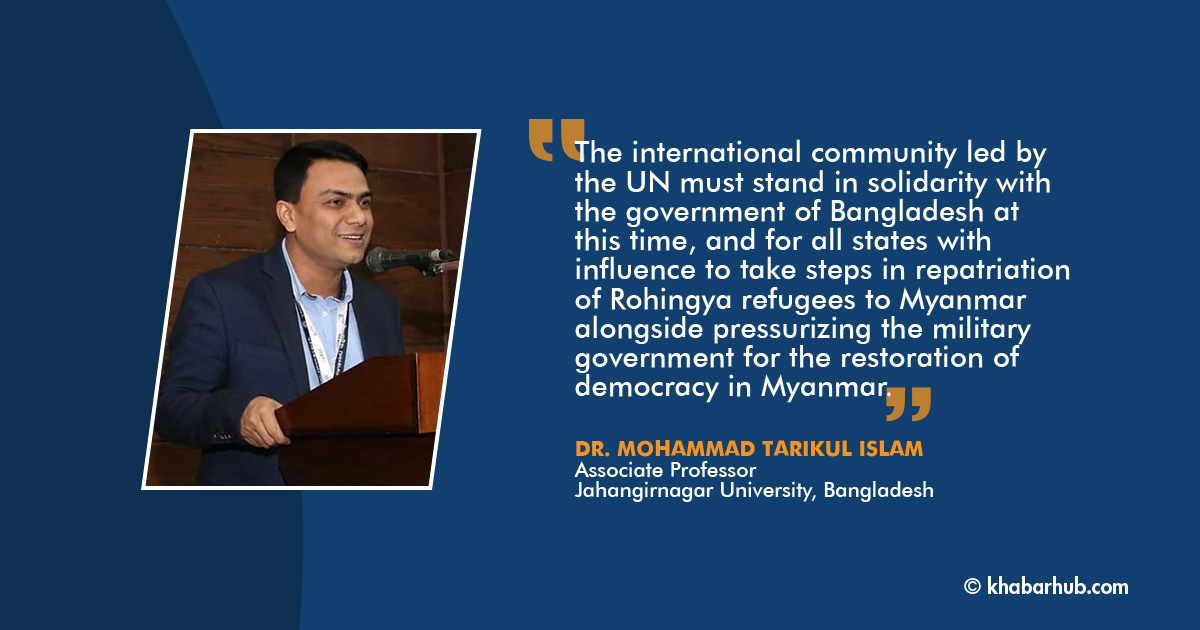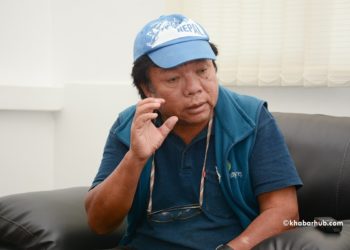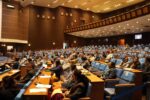The military coup in Myanmar on 1 February 2021 has brought fears up in neighboring Bangladesh that the military government of Myanmar may not respect responsibilities to repatriate Rohingya Muslim refugees currently in Bangladesh.
Myanmar’s military, which administered the nation (otherwise called Burma) for a very long time until 2011, again took power and captured democratically elected leader Aung San Suu Kyi and other members of her National League for Democracy party.
Fears of a military overthrow have been stewing in the Southeast Asian country since the military questioned the results of the November 2020 general election.
Suu Kyi’s National League for Democracy won in an avalanche triumph, securing 396 out of 476 seats, letting the National League for Democracy party to form an administration for five additional years. The military-supported Union Solidarity and Development Party won only 33 seats.
Myanmar government has been very reluctant to take back their nationals, the Rohingya, despite the robust diplomatic endeavors of the Bangladesh government regarding repatriation.
The United States of America, the United Kingdom and the European Union have utterly criticized the military coup in Myanmar.
In a press statement, the Ministry of Foreign Affairs said that Bangladesh needed harmony and strength in Myanmar and that the cycle of bringing home of the Rohingyas would proceed.
The military coup in Myanmar on 1 February 2021 has raised fears in neighboring Bangladesh that the new regime may not honor commitments to repatriate Rohingya Muslim refugees currently in Bangladesh.
Bangladesh firmly adheres to and promotes democratic ethos. Bangladesh believes the democratic process and constitutional arrangements will be upheld in Myanmar.
Let’s go into the immediate reaction of the United States. The US President Joe Biden sharply criticized the military takeover and detention of civilian officials citing the coup as the direct assault on the country’s transition to democracy and the rule of law.
He showed his keen interest to work with US strategic and development partners throughout the region and the world to help Myanmar in the restoration of democracy.
However, the reality suggests that the Bangladesh government may not succeed in sending all of them back even in a single go with the utmost diplomatic niche.
Mr. Antonio Guterres, the UN secretary-general, “strongly condemned” the detention of Myanmar’s civilian leaders on the eve of the opening session of the country’s new parliament.
Bangladesh is now hosting around one million Rohingya refugees and this highlights the serious concern of human security.
Myanmar government has been very reluctant to take back their nationals, the Rohingya, despite the robust diplomatic endeavors of the Bangladesh government regarding repatriation.
I have observed that rights groups and the international community have condemned the relocation of Rohingya refugees to the Bhashan Char, saying it is low-lying land, yet the public authority said all the assurance measures were set up in Bhashan Char.
The issue drew more noteworthy worldwide consideration with 700 thousand Rohingya escaping their nation and intersection the boundary to Bangladesh three years prior now inside a range of only a couple months.
Consequently, the Rohingya displaced person emergency is not anymore a homegrown or inward matter of Myanmar; rather, it is currently perhaps the most pivotal worldwide emergencies.
Although, the UN and different rights groups asserted that they have restricted data about the thing that has been going on and that the public authority still can’t seem to permit a specialized group to evaluate the possibility of the lodging project in Bhashan Char.
UN and rights groups have been scrutinizing the possibility of migration to Bhashan Char, saying it is a low-lying secluded island and has dangers of flooding, however at a point a year ago consented to send a specialized group to survey the condition and mentioned the public authority to permit the visit before movement.
The UN additionally said any movement ought to be deliberate and all insurance estimates should be set up.
Despite Bangladesh’s sincere efforts, Rohingya repatriation could not be started in more than three years after some 750,000 Rohingyas fled a brutal military crackdown in Myanmar’s Rakhine State.
The reality suggests that the presence of about a million Rohingyas in limited space has become risky. It left the local livelihood, environment and socio-economic situation under threat.
There were also security challenges in the crowded camps. Considering the reality, I strongly believe the UN and international community should appreciate the relentless undertaking of the Bangladesh government for giving a protected and tranquil living of the Rohingya displaced people on one side while accelerating its diplomatic niche to repatriate them with dignity in Myanmar on the opposite side.
Following the military coup in Myanmar, China said it hopes all sides in Myanmar can manage their differences within the constitutional and legal framework and uphold stability.
What’s more, it isn’t just basic for Bangladesh’s homegrown advantages yet in addition to provincial solidness. Another extent of raising the Rohingya bringing home issue has been opened before Bangladesh because of the ascendance of a fairly chosen government for power.
Bangladesh is making every effort in a professional fashion to harness regional and global power to end in an amicable solution to this emerging crisis despite the position of China on the side of Myanmar on the Rohingya issue.
We have noticed China is having a huge strategic and economic interest in Myanmar. Even Russia seems compassionate to Myanmar on this issue. Bangladesh’s government has been experienced over the months while unveiling their diplomatic efforts in persuading Myanmar to repatriate the refugees.
However, the reality suggests that the Bangladesh government may not succeed in sending all of them back even in a single go with the utmost diplomatic niche.
Myanmar and Bangladesh agreed in late 2017 to complete the return of hundreds of thousands of Rohingya refugees within two years, notwithstanding international doubts that they will be held in forbidding detention camps that may result in another round of cruelty both physically and psychologically.
Even Prime Minister Sheikh Hasina in April 2018 sought the affirmative role of China, Russia, India and Japan in resolving the Rohingya crisis.
To me, South Asian countries must show solidarity with Bangladesh and support Myanmar to start creating conditions for the voluntary, safe, and dignified return of Rohingya refugees.
What it really implies is that Bangladesh presently feels that the genuine answer for the Rohingya emergency is serene and manageable bringing home.
What’s more, it isn’t just basic for Bangladesh’s homegrown advantages yet in addition to provincial solidness. Another extent of raising the Rohingya bringing home issue has been opened before Bangladesh because of the ascendance of a fairly chosen government for power.
Experts believe that the military coup will be an early test of President Joe Biden and Secretary of State Antony Blinken’s ability to tackle a foreign policy crisis, while the US struggles with the COVID-19 pandemic, a brutal economic downturn, and an impeachment trial.
The UN Security Council should initiate a visit to the Rohingya refugee camps to force the government of Myanmar for setting up “safe zones” for people of all backgrounds in conflict-torn parts of Myanmar as proposed by the Prime Minister of Bangladesh.
United Nations, which is found to be very emphatic for meaningful repatriation of Rohingya refugees from Bangladesh must coordinate and communicate with donors and other relevant stakeholders to come forward to solve this problem permanently by putting pressure on the Myanmar government to take back its citizens by creating a safe and secured environment alongside its global commitment to work closely with the global community for the restoration of democracy in Myanmar.
As Bangladesh and India have continued to consolidate their political, economic, trade and cultural relations as well as have built a comprehensive institutional framework to promote bilateral cooperation over the decades, India must come forward to join hands with the Bangladesh government for a swift repatriation of Rohingya refugees. We also expect China besides Bangladesh to resolve this prolonged crisis.
The UN, at the same time, must enforce the recommendation of the Annan Commission by applying diplomatic pressure on Myanmar.
The UN Security Council should initiate a visit to the Rohingya refugee camps to force the government of Myanmar for setting up “safe zones” for people of all backgrounds in conflict-torn parts of Myanmar as proposed by the Prime Minister of Bangladesh.
For the sake of humanity, the international community must take due steps immediately for the peaceful and dignified repatriation of Rohingya for the greater interest of peace and tranquility in the region.
Bangladesh government, of course, works persistently with Myanmar for the voluntary, safe and sustained repatriation of the Rohingyas sheltered in Bangladesh.
(Dr. Mohammad Tarikul Islam is an Associate Professor of the Department of Government and Politics at Jahangirnagar University in Bangladesh. He has been a Visiting Scholar at the University of Oxford and the University of Cambridge, United Kingdom. Before joining the university, Dr. Islam was serving the United Nations Development Programme for a period of seven years. The School of Oriental and African Studies-SOAS, University of London has recently appointed Professor Islam as an Honorary Visiting Fellow)









Comment